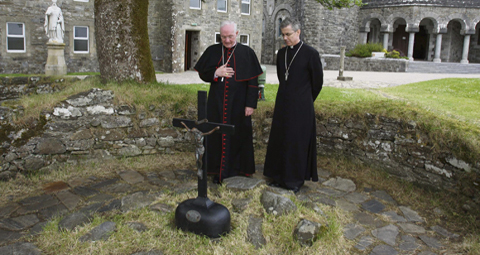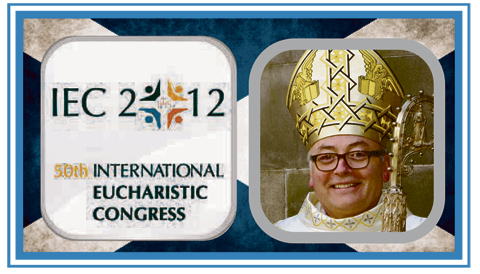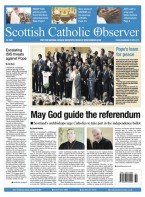June 14 | ![]() 0 COMMENTS
0 COMMENTS ![]() print
print

LIVE BLOG FROM IEC 2012—Day 4 Wednesday: Scottish pilgrims arrive; Papal Legate meets abuse victims
Auxiliary Bishop Stephen Robson, Scotland's newly ordained bishop, blogs on the 50th International Eucharistic Congress in Dublin. In this post the joy of the Scottish pilgrims arrival is tempered by Cardinal Marc Ouellet's timely, pastoral and appropriate message on clerical abuse
 Our coach group of Scottish pilgrims left Edinburgh at 5.15am; Harthill at 5.45am and Glasgow at 6.30am Wednesday morning en route for Cairnryan. The crossing was very calm, the sea like a millpond. Having crossed to Larne the group began its journey south to Dublin, arriving at the hotel in Dublin at 3.30pm.
Our coach group of Scottish pilgrims left Edinburgh at 5.15am; Harthill at 5.45am and Glasgow at 6.30am Wednesday morning en route for Cairnryan. The crossing was very calm, the sea like a millpond. Having crossed to Larne the group began its journey south to Dublin, arriving at the hotel in Dublin at 3.30pm.
The plan was first to collect the pilgrim packs from the Royal Dublin Society and then, after an early supper, to make our way into the RDS for the evening Eucharistic Procession. But we discovered we had to pay a further 39 Euros—to join a religious service! So we had Mass in our hotel with our own adoration of the Blessed Sacrament! By this time we were mightily tired anyway. And Cardinal Keith O’Brien had very thoughtfully delivered our pilgrim packs to our hotel.
Meanwhile Cardinal O’Brien and our other bishops were having a wonderful day. Our own bishops have been arriving—Tuesday Bishop Joseph Toal, yesterday Bishop Philip Tartaglia and today Archbishop Mario Conti, accompanied by Fr Tom White, chancellor of Glasgow Archdiocese.
Papal legate on penitential island
As I had mentioned in my last blog, Cardinal Marc Ouellet, the Papal legate, had made a trip to the penitential island in Lough Derg that was and is site of Irish penitential practice (photograph above, caption below). The Church in Ireland has suffered much in recent years—laity, religious and clergy—due to the revelations of clerical abuse that have penetrated every level of the Church. The Holy Father had asked his Legate, when coming to Ireland, to pray for the victims of abuse at Lough Derg.
“Pope Benedict XVI asked me, as his Legate to the 50th International Eucharistic Congress in Dublin, that I would come to Lough Derg and ask God’s forgiveness for the times clerics have sexually abused children not only in Ireland but anywhere in the Church,” Cardinal Ouellet explained.
“Lough Derg in Ireland is the symbol of conversion, penance and spiritual renewal. Many people come here to pray, to fast and to apologise for their sins. According to a long tradition, they follow the steps of St Patrick who evangelised the country in the fifth century.
“I come here with the specific intention of seeking forgiveness, from God and from the victims, for the grave sin of sexual abuse of children by clerics. We have learned over the last decades how much harm and despair such abuse has caused to thousands of victims. We learned too that the response of some Church authorities to these crimes was often inadequate and inefficient in stopping the crimes, in spite of clear indications in the code of Canon law.
“In the name of the Church, I apologise once again to the victims, some of whom I have met here in Lough Derg.
“I repeat here what the Holy Father told to the victims in His Letter to the Catholics of Ireland: ‘It is understandable that you find it hard to forgive or to be reconciled with the Church. In her name I openly express the shame and remorse that we feel. At the same time, I ask you not to lose hope. It is in the communion of the Church that we encounter the person of Jesus Christ, who was himself a victim of injustice and sin.’
“From the context of this International Eucharistic Congress, I reaffirm the commitment of the Catholic Church to create a safe environment for children and we pray that a new culture of respect, integrity, and Christ like love would prevail in our midst and permeate the whole society.”
Surely a very timely, pastoral and appropriate message.
Exploring ministry
Yesterday the theme of the congress was exploring and celebrating ministry—ordained and lay—and placing our gifts at the service of communion.
Archbishop Michael Miller of Vancouver, Canada, was in enthusiastic voice. His catechesis on the priesthood was long and detailed but his message was basically simple: The priest is a man of communion who brings together and fosters communion among the people of God and it is also the priest’s mission to lead the people to that encounter with Christ in the Eucharist which is their source of life, communion and sustenance. Archbishop Miller concluded his talk, summing up as follows: “The ministerial priest is called to live intensely the Eucharistic mystery. This is at the heart of his mission of serving the faithful: to draw them into an intimate and personal relationship with the Lord and to build up the Body of Christ as a holy communion of people united with one another in service of the wounded Church and restless world which the Lord is drawing to himself from the Cross lifted high above the earth (cf Jn 12:32).”
The main Liturgy of the day was the Holy Mass celebrated by all bishops and priests present including main celebrants Archbishop Miller of Vancouver, former Secretary to the Congregation for Catholic Education in Rome and Cardinal Rodríguez Maradiaga, Archbishop of Tegucigalpa in Honduras.
Cardinal Maradiaga crafted a lovely homily using the life of the Saint of the day, the 12/13th Saint Anthony of Padua, to illustrate his point that the Church makes the Eucharist and the Eucharist makes the Church.
“First of all, […the Eucharist…] is a gift of the Lord, of which the priest is not the owner but the servant,” he said. “The Eucharist is the most splendid Sacrament of the Presence of Christ; it is inevitable that the Eucharist has a transformative action in the heart of anyone who lives it. The Eucharist is a gift of love which will be only fully understood in eternity.”
Cardinal Maradiaga stated that: “Blessed John Paul II, in his Encyclical Letter Ecclesia de Eucharistia (2003) recalled that the church ‘draws her life from the Eucharist and has placed this sacrament at the centre of its pastoral ministry. In the Eucharist, Christ gives his body and his blood for the life of humanity. And those who are nourished in a dignified way at the table become living instruments of His loving, merciful and peace-bringing presence.’
There is a lovely, simple, exposition of the doctrines of Eucharist and Orders here and a skillful and strong defence of the inter-relatedness of both.
Evening
In the evening the Procession of the Blessed Sacrament took place, around the RDS and the adjacent streets of Dublin—but without us! We had our more modest and yet still prayerful time of prayer and adoration—our hotel!
— Auxiliary Bishop Stephen Robson is the Bishops’ Conference of Scotland’s national delegate for the 50th International Eucharistic Congress. He was ordained Auxiliary Bishop of St Andrews and Edinburgh on June 9 2012 before heading to IEC 2012.
Pic: IEC Papal Legate Cardinal Marc Ouellet, left, and Archbishop Charles Brown, apostolic nuncio to Ireland, visit the ‘penitential beds’ containing the remains of Celtic monastic life at Lough Derg in County Donegal, Ireland, June 12. During his visit to Lough Derg , Cardinal Ouellet, met privately with people who were abused as children by clerics or members of Church institutions.











